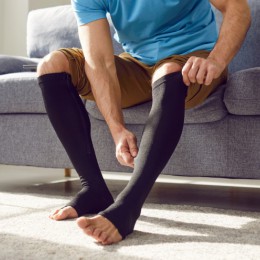
Incontinence can be embarrassing and tough to discuss, but if you are facing this problem you are not alone. According to the National Association for Incontinence (NAFC), urinary incontinence (UI) affects 200 million people worldwide (1) with 25 million adult Americans experiencing temporary or chronic UI.
UI is most prevalent in women. In fact, research results indicate that one in four women over the age of 18 experience episodes of leaking urine involuntarily (2).
Men often experience UI after prostate surgery and in many cases, the incontinence resolves itself in four to six months after the operation. Some may also experience urine leakage during physical activity.
Women often experience UI problems caused by menopause, a urinary tract infection, or pregnancy.
Most people generally view incontinence as a normal process of aging. Information on healthy bladder function can help promote the understanding that incontinence is not a disease itself, but is a symptom caused by other problems within your body that are usually treatable (3).
According to research, nearly two-thirds of men and women age 30 to 70 have never discussed bladder health with their doctor (2). Understanding the many types of incontinence and why it occurs may help you feel more comfortable talking about and confronting the problem.
Types of Incontinence:
Stress Incontinence
Stress incontinence or stress urinary incontinence (SUI) is when involuntary leakage or dripping of urine occurs due to inadequate strength of the pelvic floor muscles. Any movements that increase pressure in the abdominal area such as coughing, sneezing, laughing, physical activity, etc. will cause the leakage of small amounts of urine.
SUI is the most common type of incontinence in men and often occurs after a prostatectomy. SUI occurs in women when physical changes to the abdominal area occur. These changes may result from pregnancy, childbirth, and menopause.
SUI can also occur during the week before a women's menstrual period because estrogen levels are lowered at this time. This leads to lower muscular pressure around the urethra which increases the chance of urine leakage.
Urge Incontinence or Overactive Bladder
Urge incontinence is when the bladder's muscular wall has a sudden contraction causing an urgency to urinate and an involuntary loss of urine. These contractions can occur because of damage to the bladder's nerves or to the actual muscles. Sitting, standing or fast movements can trigger urge incontinence.
Those with this type of incontinence can experience urine leakage during sleep, after consuming a small amount of water or when they touch or hear water running. It is common for women to acquire this as a result of their pregnancy.
Bowel Incontinence
Bowel incontinence or fecal incontinence is the loss of control over your bowels. Common causes include prolonged muscle stretching caused by constipation, muscle damage to the internal and external sphincters, damage to the nerves that control sphincter function, decreased storage capacity caused by scarring on the walls of the rectum, and diarrhea. A weakened pelvic floor may also cause bowel incontinence.
Functional Incontinence
Functional incontinence arises when you identify the need to urinate but are unable to make it to a restroom because of limited mobility. Generally, you lose large amounts of urine.
There are many causes of functional incontinence some of which include poor mobility, depression, dementia, anxiety, low dexterity, or any other situation in which it is not possible to reach a bathroom.
Overflow incontinence
Overflow incontinence is the loss of the ability to identify the need to urinate. The bladder never empties and therefore continuously leaks.
This type of incontinence is caused by weak bladder muscles, a blocked urethra due to a kidney stone or tumor, or from diseases that affect the autonomic nervous system which can reduce the signals from the bladder.
In men, the enlargement of the prostate can restrict the flow of urine and cause overflow incontinence. This form of incontinence is rare in women but can be caused by fibroid or ovarian tumors or from a twist in the urethra. An early warning sign is a slow or timid stream of urine during voluntary urination.
Transient incontinence
Transient incontinence is temporary incontinence caused by certain medications, limited mobility, mental disability, urinary tract infections, and severe constipation, which can pinch the urinary tract closed and block urine flow. If urine leakage still occurs after all temporary causes of incontinence have been dealt with, the condition becomes established incontinence.
Incontinence can make you feel humiliated and alone, but self-treating incontinence is not the most effective way to manage the problem. Do not be afraid to talk to others about your concerns and don't hesitate to make an appointment to see your doctor to address these issues.
(1) Vulker, R. International Group Seeks to Dispel Incontinence "Taboo", JAMA, 1998, No.11: 951-53.
(2) Muller N. What Americans Understand How they Affected by Bladder Control Problems: Highlights of Recent Nationwide Consumer Research. Urologic Nursing. 2005:25(2): 109-115.
(3) Bell M, DeMarinis M. The psychological cost of incontinence. ECPN. 2006;109:13-14.





james anderson | Mar 8th 2022 @ 10:30 AM
I can only aspire to write material like this. I am extremely impressed with your presentation of the sound points in this article.this content will helpful to reduce a stress Stress Incontinence in Abu Dhabi